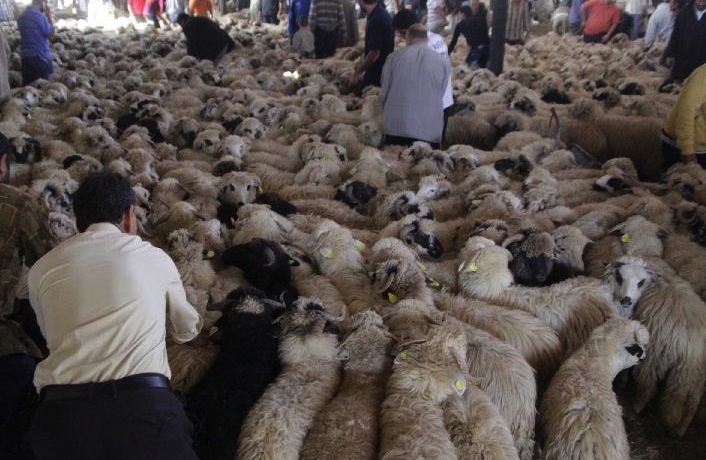By Michel Cousins and Mohammed Elsharif.
Tripoli, 25 October:
Libyans . . .[restrict]were out on the last day before Eid looking for a bargain to buy for tomorrow’s sacrifice. Many were disappointed. This year’s higher-than-ever prices held up throughout the day, largely because so many people were trying to buy.
At a small collection of impromptu sheep pens by Tripoli’s Sidi Mesri roundabout today, Thursday, some 60 buyers were haggling in the hope a good deal. But sheep were still selling at as much as LD 800, compared to a high last year of around LD 500.
Prices were the same at the massive, temporary market near the new highway project by Bu Sleem. It was packed with last minute shoppers. Some were happy with bargains they made. One man had paid LD 750 for a large sheep and was showing it off to others, telling them what a good price he had got.
Generally, however, there was widespread frustration at the prices being charged. One angry would-be purchaser furiously complained that the sheep on offer had imperfections and could not be sacrificed. “You’re a cheat”, he accused the stallholder. “Even if you asked just fifty dinars, I wouldn’t buy it”, he cried.
“Why is this year so expensive?” another buyer asked. “Ah, well,” replied the dealer with a philosophical turn of phrase, “a year for us and a year for you” (sometimes it is a sellers’ market; sometimes a buyers’ one).
The roaring trade was put into context by one dealer. “I’ve not eaten anything since yesterday. I just want to sell my sheep and get home”, he said. He was not giving any bargains either.
Everyone wanted Libyan sheep despite reports that they are being fed on old bread and pasta and that foreign ones are cheaper. Very few appeared to be buying imported animals. “As soon as I looked at a Sudanese sheep for the first time, I got scared” said taxi driver Mukhtar Zaghzawi. “It’s so ugly.”
Dealers were busy calling out their offers. One was shouting that he had lambs for LD 350. On inspection they were far too small to sacrifice.
Yesterday, prices had come down, albeit temporarily. They were between LD 350 to LD 600, compared to LD 600 to LD 800 just a few days ago. The fall was the result of people deciding to hold off until the last minute before buying in the hope the hope of a fall in prices.
The drop meant economic pain for some amateur dealers who had thought that they could make a quick profit. One Tripoli businessman, reckoning that the price would go even higher than LD 800, bought 300 from Benghazi, paying LD 750 each. On Wednesday he was selling them at LD 500.
Today, with prices up again, many people without LD 600 or LD 800 to spare were still hopeful that they could drop by evening.
“I’m going to wait until night time, to see if prices come down”, one man told the Libya Herald. Another said he was going to wait until tomorrow morning. “I expect them to go down 20 percent”, said a Tripoli schoolteacher, giving his name as Abdurrahman.
Many were blaming the high prices on the General National Congress’ decision to give every family LD 1,000 for a sheep for Eid, although the money is not due to be paid for another two months. It is seen as having been inflationary, with farmers and traders reckoning that customers could afford to pay far more than last year.
However, there were another view. “I blame the (Agriculture) Ministry”, said one of its officials, speaking off the record. Animal food subsidies, he said, had been delayed and farmers had had to buy from the market. There, prices were 20 percent up and this, he insisted, had had a knock-on effect on the price of a sheep.
There were one or two exceptions to the general determination to buy a sheep at any price. “I’m not celebrating Eid this year because people form Bani Walid have nothing to celebrate”, said Karima Al-Fassi, herself from the town.
But there were no such feelings in Tripoli’s impromptu sheep markets yesterday.
The Libya Herald left the Bu Sleem market with a medium-sized lamb that cost LD 400. It was a bargain but it was all the money we had. “Take it or leave it”, the dealer was told.
He took it. [/restrict]








